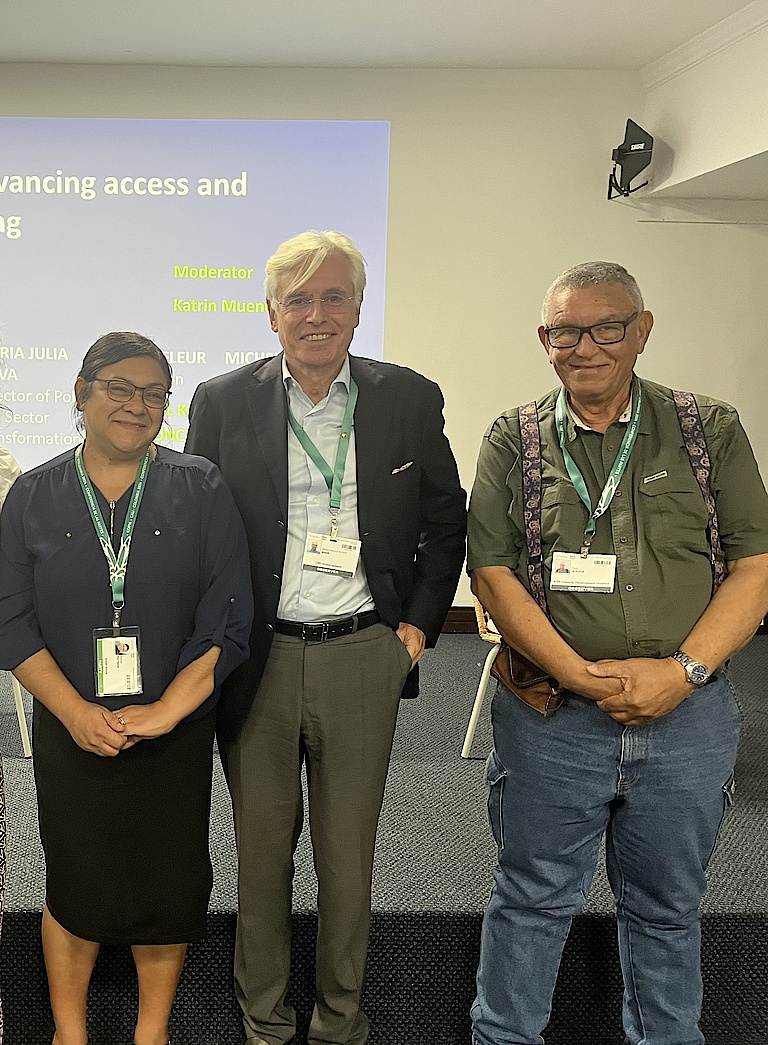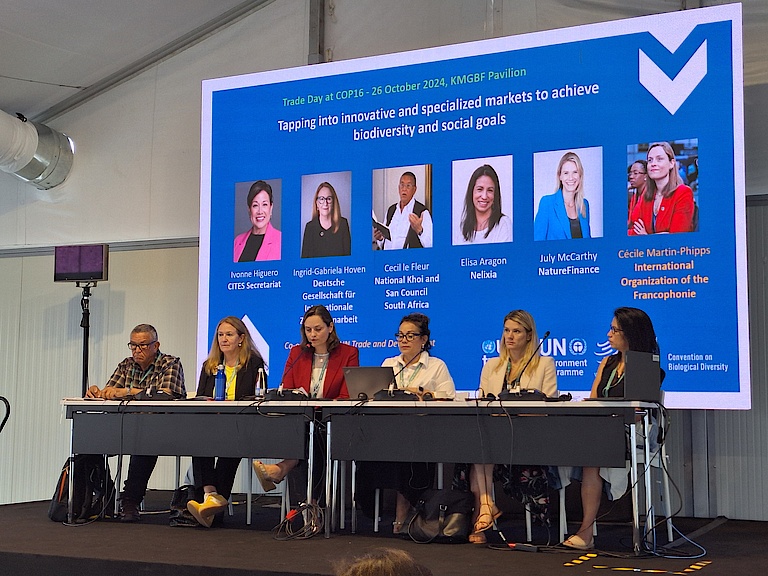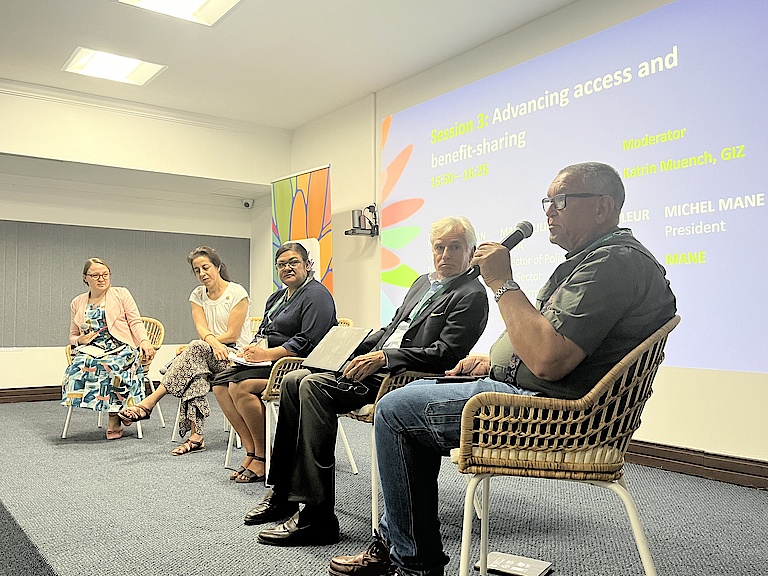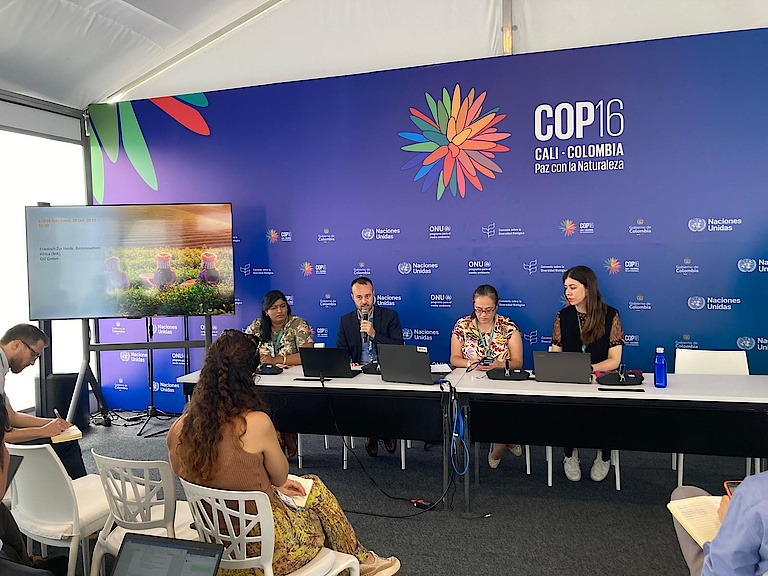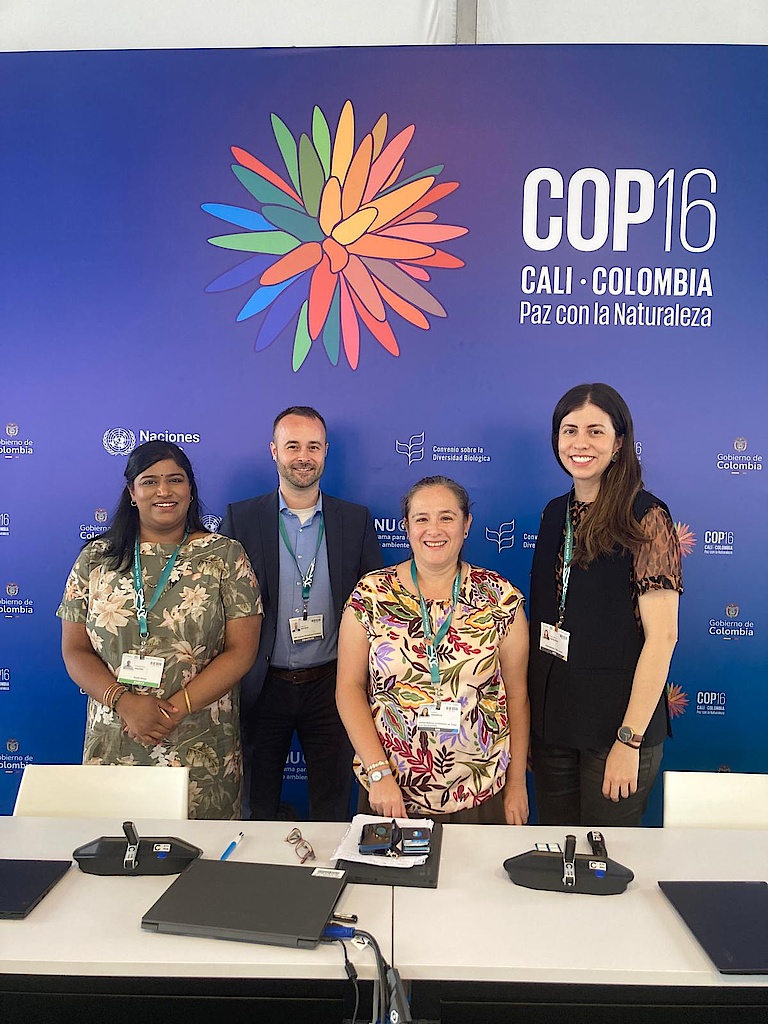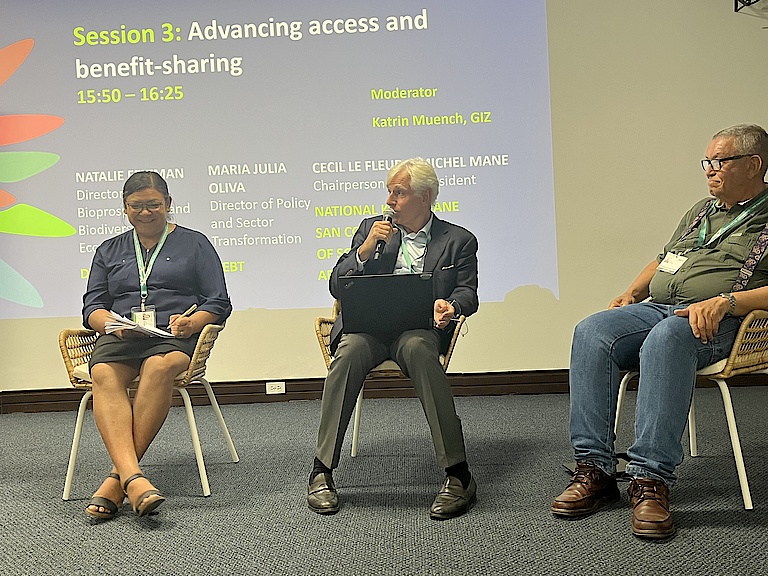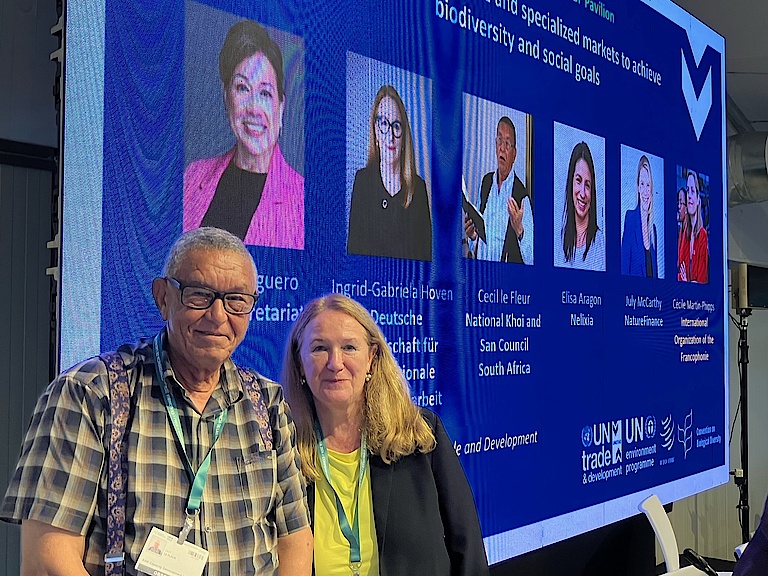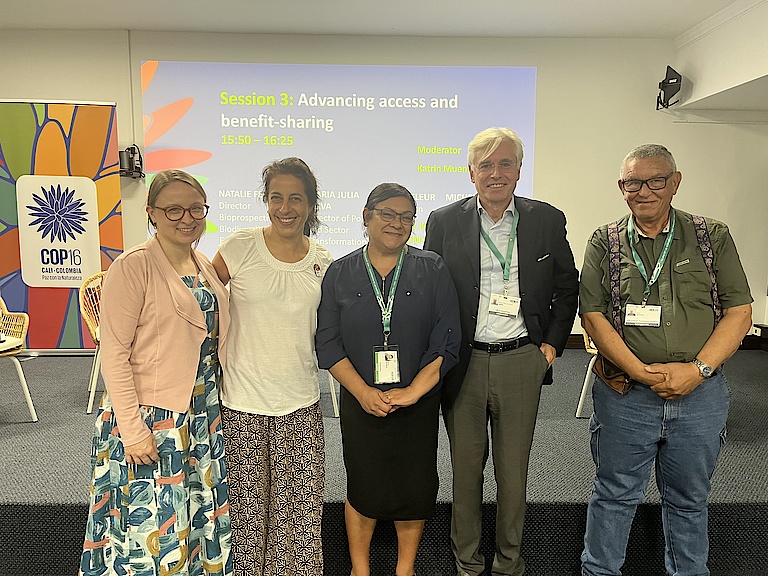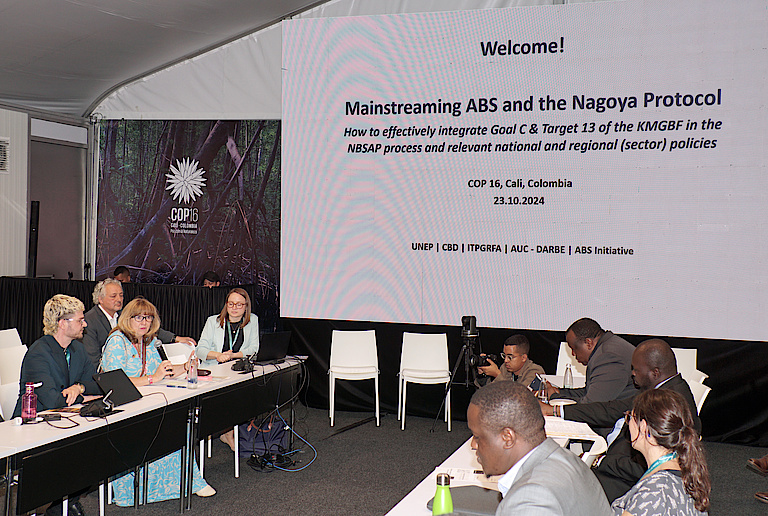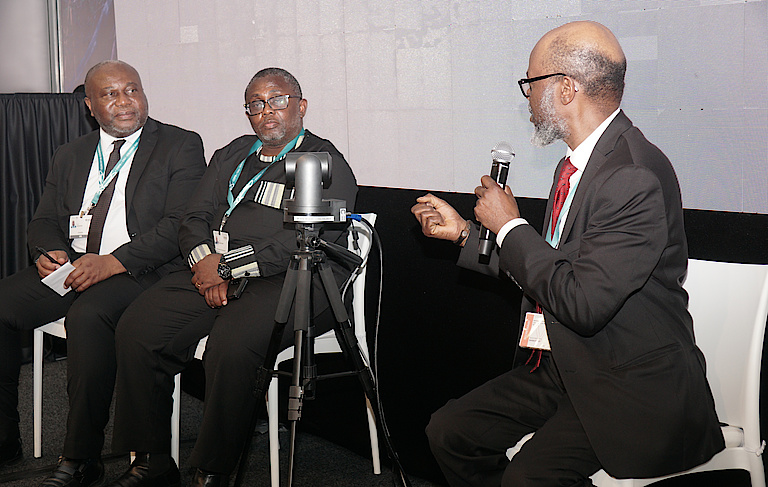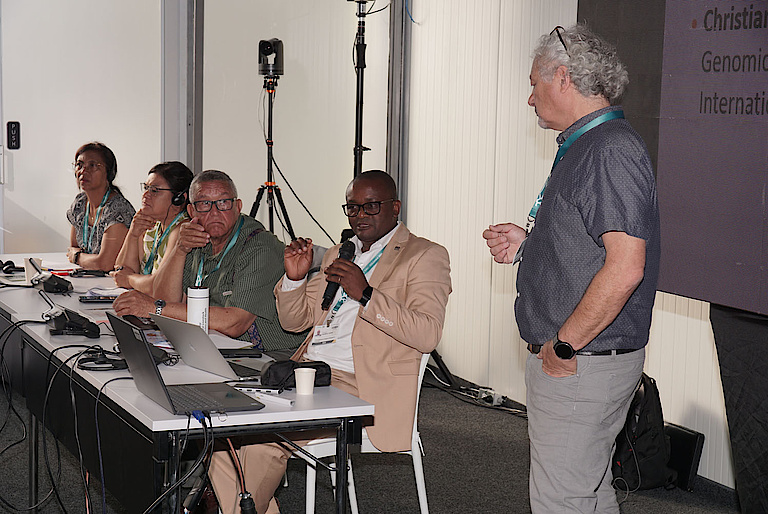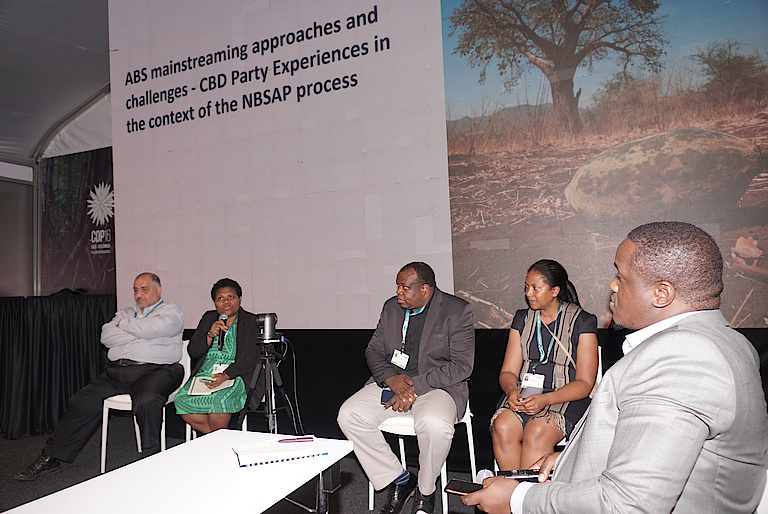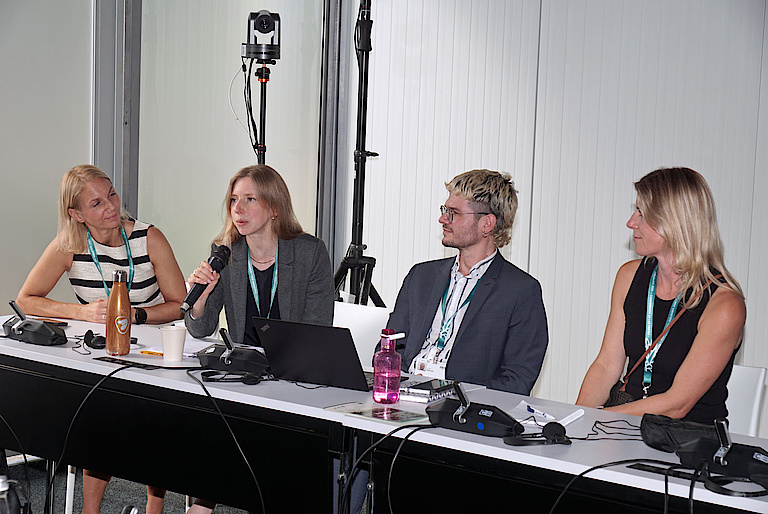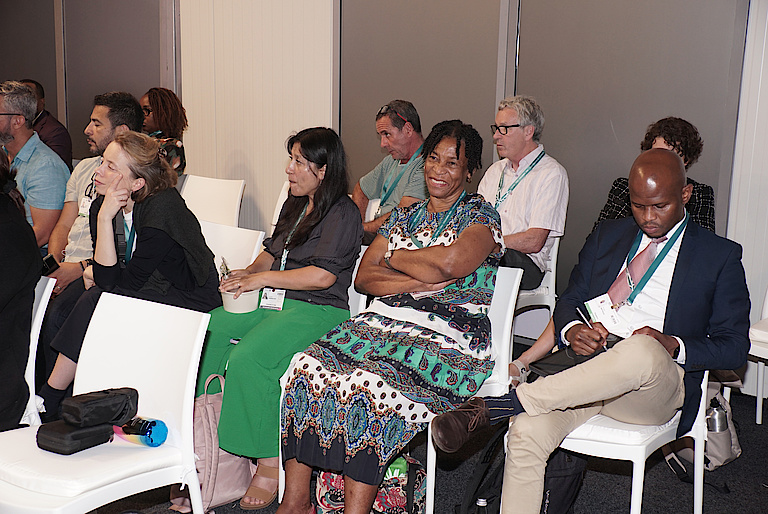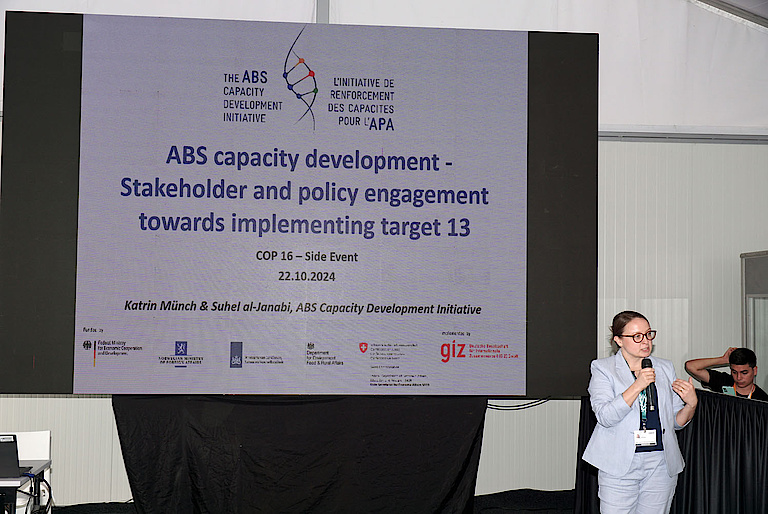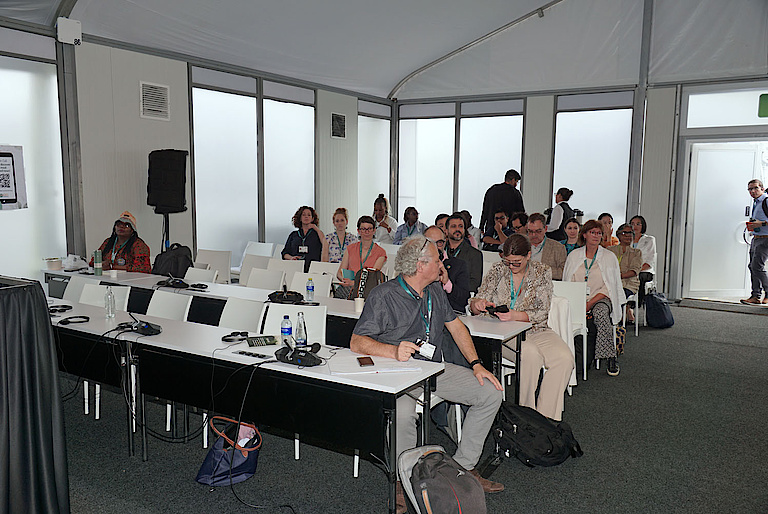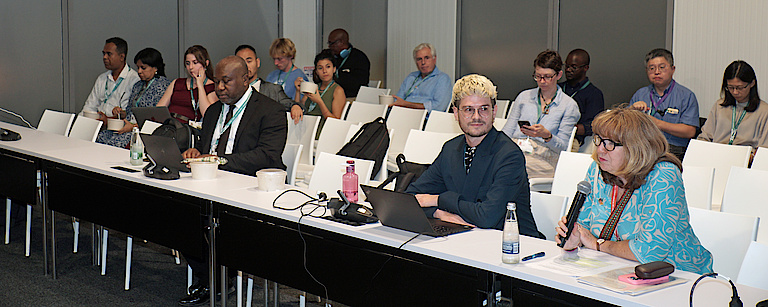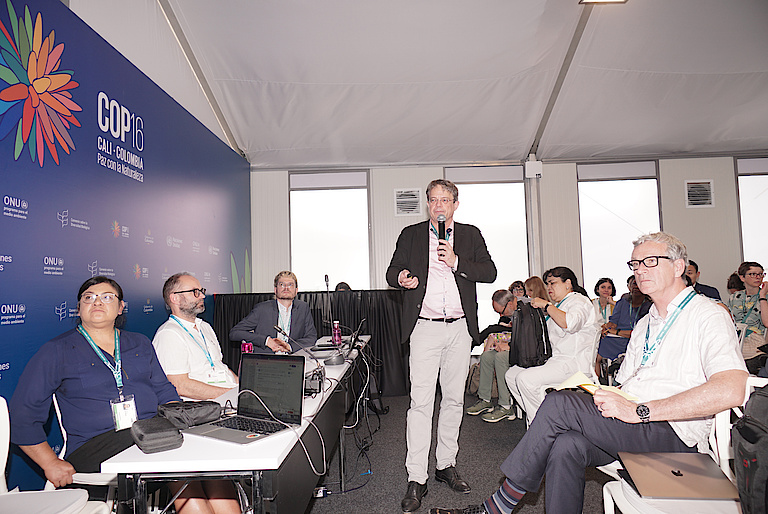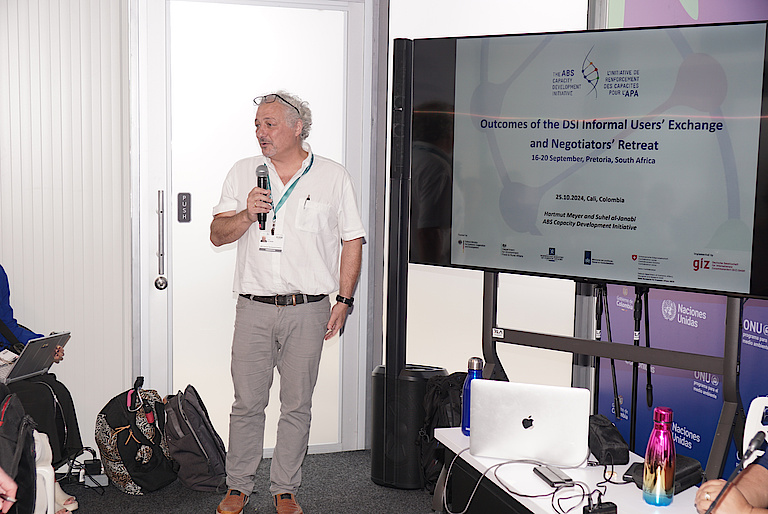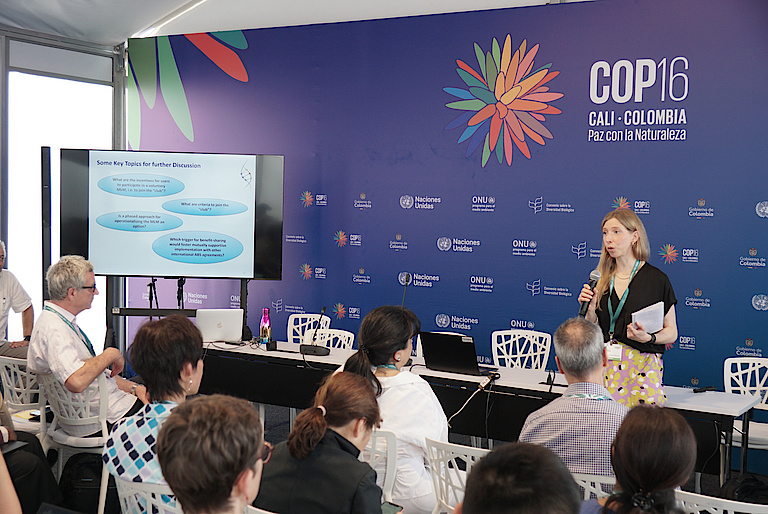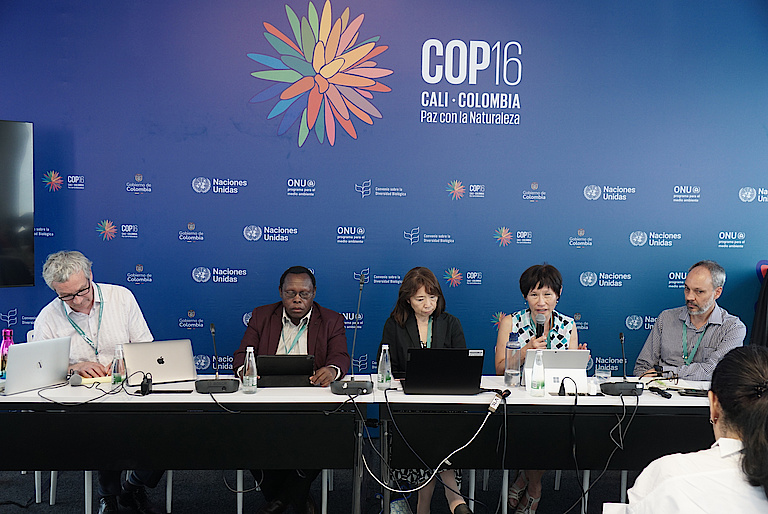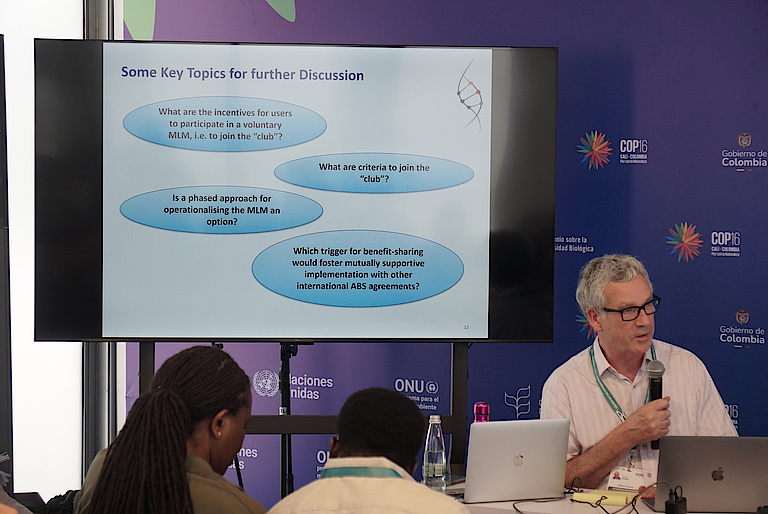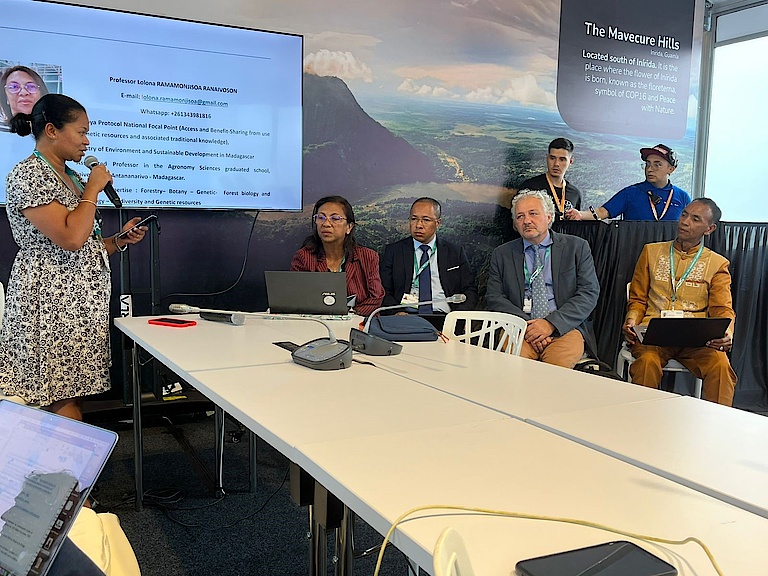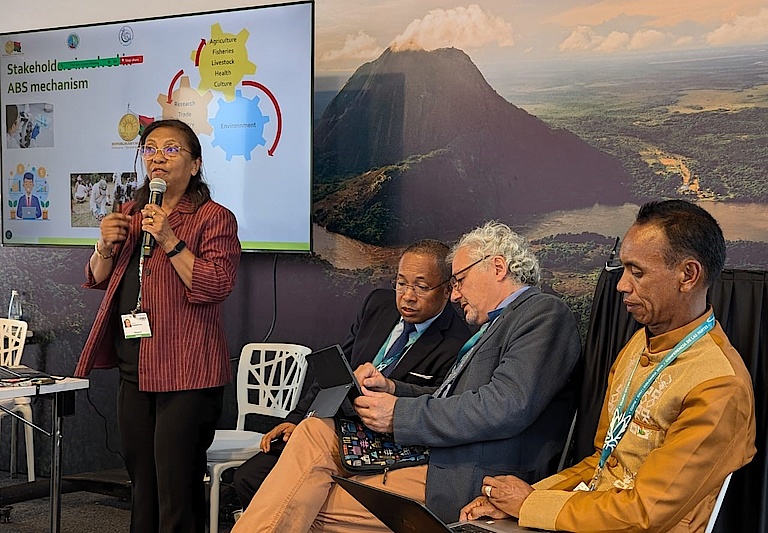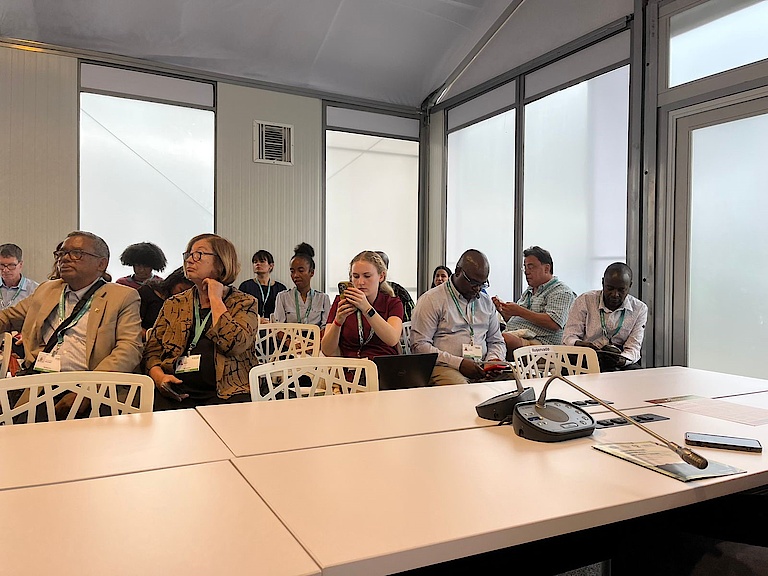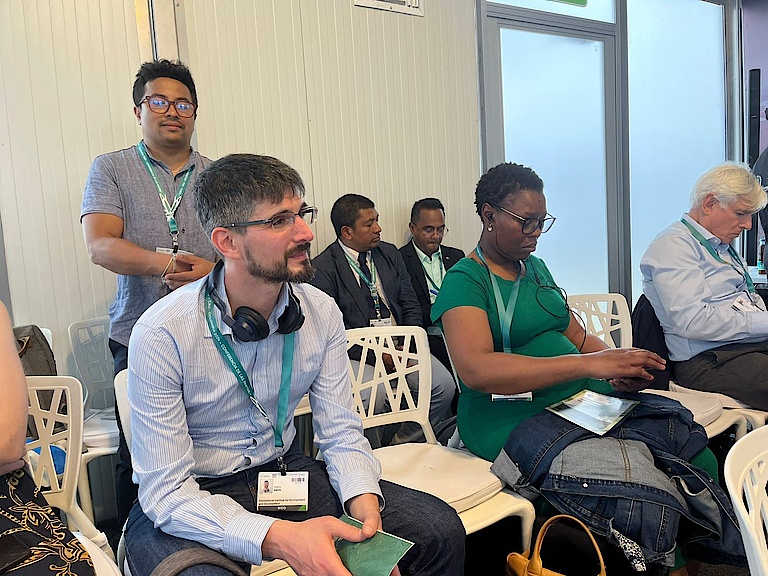The 16th Conference of the Parties (COP16) to the Convention on Biological Diversity (CBD) took place in October 2024 in Cali, Colombia, with 23,000 officially registered participants. It is a pivotal platform for global discussions on biodiversity conservation and sustainable use, through official negotiations and further events for stakeholders to share insights, foster partnerships, and explore innovative solutions.
The ABS Capacity Development Initiative, BioInnovation Africa and ABioSA hosted and participated in several events diving into important strategic and implementation related topics regarding the KMGBF and benefit-sharing such as:
-
Biodiversity-based businesses, BioTrade and partnerships
-
Mainstreaming ABS into trade, economics, research and NBSAPs
-
Digital Sequence Information (DSI) and Benefit-Sharing
Biodiversity-based businesses and ABS agreements
Nature positive business models were one of the focal areas of GIZ's presence at the COP16 in Cali. In three side events – co-organized with UNCTAD and UEBT -, local providers of genetic resources and traditional knowledge, regulators, business representatives and international development experts analysed biodiversity-based sectors and value chains with respect to benefit-sharing impacts and, in a broader context, the BioTrade principles and criteria.
Insights from the side events:
- Ethical and biodiversity-friendly biotrade can create resilient and diversified livelihoods and improve living conditions, while preserving and restoring biodiversity, as demonstrated by projects such as BioInnovation Africa and ABioSA.
- Biodiversity, its conservation and sustainable useis integral to the companies’ business models in sectors like healthcare, biotechnology, flavours and fragrances as well as cosmetics. Read here about BioInnovation Africa’s Devil’s Claw partnership.
- Market pull, business networks, and sector knowledge are essential for effective collaboration.
- An enabling environment for ABS compliant value chains and support for market access are needed, such as sector strategies, regulatory framework, conducive business environment and access to finance for SMMEs.
- Enabling environments for doing R&D and business are as important as clear ABS rules and permitting procedures are. Public-private dialogue can foster both, ideally based on a common understanding of key supporting conditions for ABS compliant value chains.
- BioTrade principles and criteria, as well as related monitoring and assessment tools provide the necessary guidance to ensure that biodiversity-derived products serve people and nature.
- Sectoral ABS agreements can create new economic opportunities for local communities and are essential to recognizing the traditional knowledge holders by playing a more active role in the valorization. Examples presented by Cecil le Fleur, chairperson of the South African Khoi and San Council, are the Buchu and Rooibos sector-wide ABS agreements. Read here about the Buchu sector development story.
ABS Events: Implementing, Mainstreaming and Supporting ABS
Key events hosted or featured by the ABS Initiative and ABioSA at COP16 in Cali provided valuable insights and discussion opportunities centring around concepts and hands-on experiences in relation to Goal C and target 13 of the “Biodiversity Plan” dealing with benefit sharing on the utilization of genetic resources, associated traditional knowledge (TK) and digital sequence information (DSI).
From ABS regulations to impacts: After a donor panel on the “why investing in ABS related capacity development”, the ABS Initiative opened discussions around new concepts for benefit-sharing from the use of genetic resources and DSI, the role of multi-stakeholder partnerships in driving commercial and non-commercial benefit sharing, the need for mainstreaming of ABS into African regional and national strategies, and the participation of IP&LCs in managing biodiversity-based value chains including ABS negotiation skills.
Mainstreaming ABS: To achieve intended development outcomes, access and benefit-sharing needs to be systematically incorporated into other relevant sectors and strategies such as health, agriculture, industry, finance - beyond the CBD “focal ministries” that deal with nature and environment and their respective authorities and administration. In a side event with UNEP and the Secretariats of the CBD as well as the ITPGRFA, the ABS Initiative explored approaches to support the effective integration of Goal C & Target 13 of the KMGBF. Partners and CBD parties shared their experiences from both country and institutional perspectives on integrating ABS aspects in the context of NBSAP processes, pointing out the main challenges.
Supporting ABS with sector development plans: As a contribution to UNCTAD’s Trade Day at COP16, the government of South Africa and holders of traditional knowledge from the Cape Region highlighted the importance of sector development plans for advancing local development and ABS. ABioSA facilitates sector dialogues and the development and implementation of such plans, which include sector-wide ABS agreements.
DSI: The way forward
At COP16, sharing the benefits arising from the use of Digital Sequence Information on Genetic Resources (DSI) was a main topic in the official negotiations and of several side events.
The ABS Initiative organised a panel discussion to follow-up on the outcomes from the International DSI Users Exchange and Informal DSI Negotiators Retreat (Pretoria 2024). This side event reflected on the concerns and hopes of commercial and non-commercial users and pathways for converging on critical topics at COP 16 (Find more under Global DSI Dialogues: Digital Sequence Information on Genetic Resources). Key topics included triggers and incentives for participating in the new multilateral mechanism for DSI benefit-sharing and distribution approaches for benefit-sharing.
The private sector perspective was also discussed in an event hosted by the company Basecamp Research on how to harmonize benefit-sharing under the bilateral mechanism of the Nagoya Protocol and the multilateral mechanism of the CBD for use of DSI.
- COP16 negotiated and adopted the modalities for operationalisation of the multilateral mechanism for DSI benefit sharing, including a fund. Main modalities are:
- The new DSI fund, called Cali Fund, will be administered by the United Nations Multi-Partner Trust Fund Office, in accordance with decisions of the CBD COP, and under the authority of and accountable to the CBD COP.
- In principle, all users of DSI should share the benefits arising from its use.
- COP 16 decided that for the time being only large companies from certain sectors should share monetary benefits and contribute to the Cali Fund one percent of their profits or 0.1 percent of their revenue, as an indicative rate.
- COP 17 will establish final thresholds and percentages based on additional studies and experiences gained.
- Funding should support the realisation of the CBD objectives in developing countries through direct allocations to CBD parties. The formula for distribution will be developed until the next COP.
- Where appropriate and subject to national circumstances, at least half of the funding should support the self-identified needs of IPLCs, including women and youth within those communities, through government or by direct payments through institutions identified by IPLCs.
- Non-monetary benefit-sharing will be facilitated through the long-term strategic framework of the CBD for capacity-building and development and the existing Clearing House. Non-monetary benefit-sharing should, inter alia, support capacity building for the generation of, access to and use and storage of DSI and self-identified needs of IPLCs, including women and youth within those communities.
- Public databases hosting DSI should inform users that using DSI from the database may require the sharing of benefits through the multilateral mechanism. They should also inform those submitting data about the necessity to adhere to national requirements concerning the publication of data, where applicable.
About Madagascar at COP16
Madagascar, as a mega-biodiversity hotspot, ratified the Nagoya Protocol in July 2014. Its ABS draft law, based on the 2017 national ABS decree, underwent several stakeholder consultations and is currently under review. In a COP 16 side event organized by the Government of Madagascar, the national ABS genesis and landscape was introduced and discussed, with particular focus on the inclusion of Malagasy IP&LCs, e.g. through the establishment of several Biocultural Community Protocols. As longstanding supporters of the implementation of ABS in Madagascar, the BioInnovation Africa project – with its focus on fostering market access and ABS compliant business partnerships – and the ABS Initiative were invited to present their capacity development activities and to participate in a discussion on approaches to increase value addition and benefit-sharing on the island.
Overall take-aways and Outlook
Main discussions of the COP16 in Cali focused on advancing efforts towards the 30x30 goal to designate 30% of land and oceans as protected areas by 2030, the need for robust financial mechanisms, aligning efforts with climate strategies discussed at UNFCCC COPs, and the role of IP&LCs. Besides smaller successes, a big gap remains in solving one of the most pressing issues: Financing. The newly established “Cali fund” – as one part of the financing instruments for the KMGBF – is supposed to allocate DSI related funds in an efficient and fair way, but depends on voluntary contributions. Incentives and triggers to participate in the related multilateral mechanism were discussed in side events on DSI (organized by the ABS Initiative, among others). The fund is foreseen to prioritize IP&LCs by allocating 50% to IP&LC related projects, where appropriate. The mechanism will be re-assessed at COP18.
After being officially acknowledged in the Kunming-Montreal Global Biodiversity Framework (GBF) drafted in the previous COP15, IP&LCs were eager to continue the conversations to consolidate their role and benefits. At COP16, IP&LC and afro-descendants received special attention: A big success was the establishment of a permanent body to strengthen the participation of IP&LCs. The ABS Initiative, ABioSA and BIA projects contributed to this conversation by emphasizing the role of inclusive partnerships, sector dialogues and ABS mainstreaming, which led to ABS agreements with traditional knowledge holders of different resources such as Rooibos and Buchu.
Supporting biodiversity-based businesses, such as biotrade, provides development cooperation a way to engage with the private sector and to see valorization and trade not only as risk reduction measures but also as opportunities. This can promote business and blended-finance models that benefit SMMEs and producer groups, generating triple benefits for nature, people, and local enterprises while addressing the Conventions’ Goals A-D in an integrated manner.
The role of SMMEs in partner countries in developing nature-positive business models and value chains was highly underrepresented at COP16. Development cooperation can play a key role in supporting the enabling environment and set up strategic public-private partnerships on a market-based approach making use of changing consumer behavior and the pressure arising from increased disclosures of business and finance operations.
COP 16 can send important impulses in the direction of Baku, Riyadh and Belem and their upcoming COPs, and promote more effective implementation of biodiversity and climate protection. In addition to the ground-breaking successes on IP&LCs, DSI, marine biodiversity, health and much more, the results on mainstreaming, capacity building and monitoring are also very important (even without final decision). The next CBD COP will take place in late 2026 in Armenia.
November 2024
